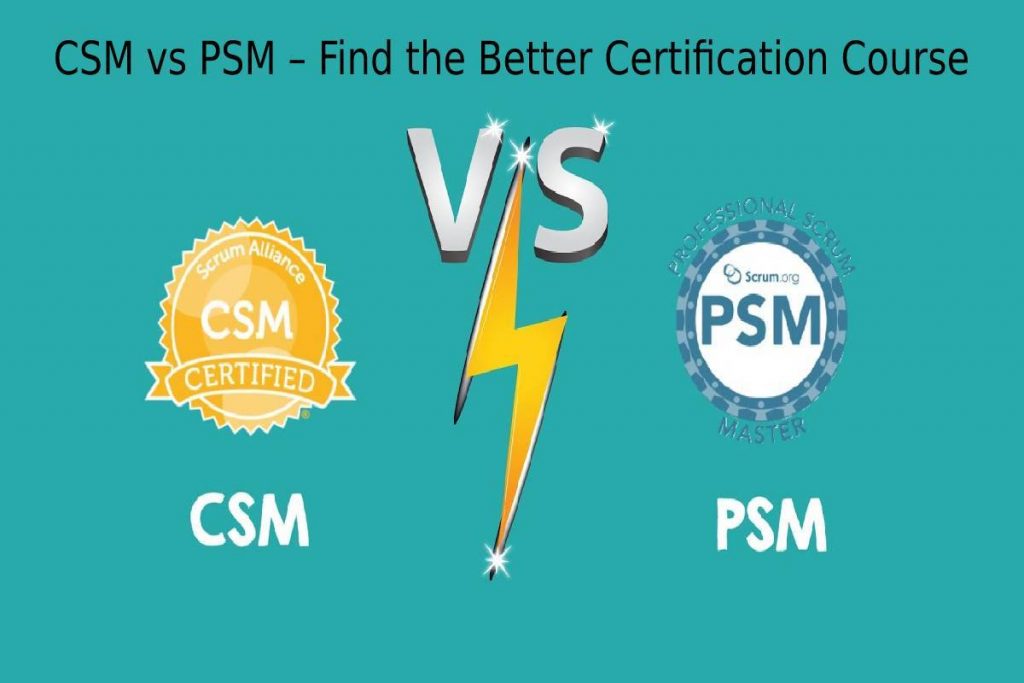Scrum Master positions are now witnessing a significant increase in recruiting. The popularity of Agile and the benefits it delivers to businesses, such as adaptability, sustainability, delighted customers, cheaper costs, and more effective processes and teams, has spurred this need. Organizations want to use the knowledge of certified employees to drive their Agile and Scrum transformations and gain the advantages of Agile.
In this article, we will look at CSM vs PSM that one may choose to learn.
Table of Contents
What is CSM®?
The Scrum Alliance offers the CSM® accreditation, which stands for Certified Scrum Master®. It is an entry-level credential for people who desire to advance in the Agile and Scrum field by mastering the Scrum framework and learning everything about team accountability, events, and strategies for implementing Scrum and leading teams. The CSM certificate demonstrates the holder’s knowledge of Scrum methods as well as their ability to lead projects successfully via collaboration, communication skills, and organization.
The most well-known and sought-after Scrum accreditation is CSM®. Professionals who complete training provided by a Certified Scrum Trainer and pass the CSM® test are awarded the CSM® certification.
What is PSM™?
The world-famous Scrum.org awards the PSM™ (Professional Scrum Master™) credential. The PSM™ is divided into three stages based on complexity: PSM I, PSM II, PSM III. This certification verifies a professional’s ability to deploy the Scrum methodology and generate value, based on a curriculum drawn from the Scrum Guide. The PSM™ I credential is awarded to the practitioners who pass the test and exhibit a basic grasp of Scrum.
Understand CSM® vs PSM™
To understand CSM® vs PSM™ in more detail, let’s read further.
- Path to Obtain the Certificate
A 16-hour live online or in-person CSM® training led by a Certified Scrum Trainer is needed of professionals. Scrum Alliance will offer you the credential of CSM® upon successful completion of this Certified ScrumMaster® Training course and passing the test.
- After completing the course, you will be required to take the CSM® test, which consists of 50 questions. To pass the exam, you must answer 37 of the 50 questions within the restricted time given.
- You will also be prompted to accept the CSM® License Agreement and complete your Scrum Alliance membership profile after completing the CSM® exam. The membership will be for a period of two years.
A two-day training session is not compulsory for professionals, but it is strongly encouraged. Professionals with a strong understanding of Scrum and how to apply it to teams and drive value can take the PSM™ test and pass it to get the Scrum.org certification.
- The PSM™ assessment consists of 80 questions that learners must solve in one hour. Here practitioners will earn the PSM™ certification and a logo after passing the exam.
- Learning Objectives
As a CSM , you will be well-prepared to assist the Scrum team in reaching their full potential, overcoming hurdles, and guiding them through the Scrum framework. A CSM is a “servant leader” who leads by example and makes it simpler for team members to complete projects successfully.
People who have earned the PSM™ have demonstrated a basic degree of Scrum mastery and are familiar with the language and approach to Scrum. Passing the PSM™ demonstrates a more in-depth grasp of Scrum concepts as well as the ability to use Scrum in more complicated settings.
- Cost of Course
There is no set fee for the CSM® test because the course exam is included in the course. The course price, on the other hand, normally ranged from 1000 to 1400 USD.
The PSM™ exam would cost USD 150 for every attempt. But for the first attempt, it is for free, if enrolled in the training course.
- Renewal Duration
Yo ust renew your CSM® certificate every two years by earning 20 SEUs and paying a $100 renewal fee.
PSM™ Certification, on the other hand, does not need to be renewed. The PSM™ certification is valid for a lifetime.
Conclusion
Scrum expertise has become one of the most in-demand skills in recent years, and both the CSM® and PSMTM have internationally recognized Scrum credentials. While many people wonder about CSM® vs PSM™ and are in dilemma of which one to choose, this post will thus assist you in making an educated decision.
